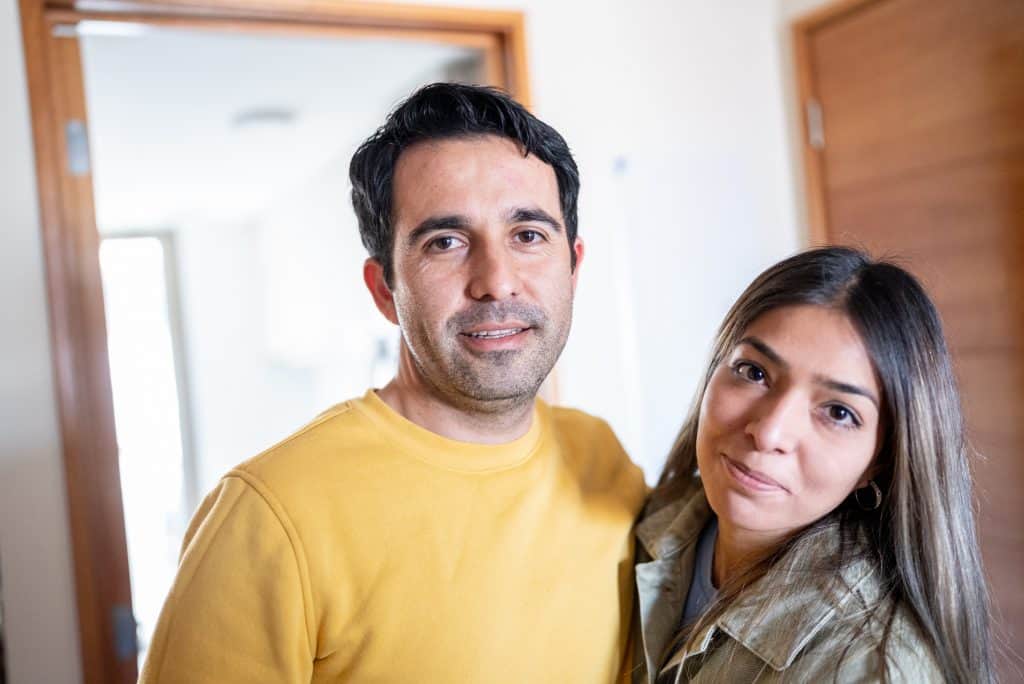This is a story I hear a lot from women: “My husband just can’t seem to kick the habit. We’ve been in this fight for years now. Whenever he gets caught, he seems to feel really badly about it. He’ll do all the right things. He seems really open about it. He’ll confess to me and others, he’ll block all the sites he’s used, he’ll go to counseling. But a few weeks or months later, he’s back in it again. I just don’t know what to do any more.”
And then they’ll say to me, “You guys got better. How did that happen?”
We did all the stuff that everybody does:
- Filter the Internet appropriately
- Find accountability partners
- Go to groups or individual therapy
Why did it work for us, when other people are doing the same things, and it’s not working for them?
It’s always just seemed like pure dumb luck to me, until I happened across a YouTube video by renowned marriage expert, Dr. John Gottman.
In his research, Gottman has found that couples who have a high level of trust within the relationship have a corresponding set of behaviors.
He identifies these trust-building behaviors as “sliding door moments”: small, seemingly insignificant moments when there is a choice to be made, for or against the relationship.
Gottman says, “In these moments, there is the possibility of connection with the partner, or turning away from the partner.”
Gottman tells a story about how, late at night, he wanted to finish reading a book, but saw from his wife’s face that she needed to talk. For him, that was a “sliding door moment” when he could either be self-centered, or relationship-centered.
When I watched this video, I thought, “Wow, that’s exactly it. That’s what Andy did. That’s how I knew he was serious about me, about our marriage, and about his recovery.”
It wasn’t just that he did the right behavioral things perfectly, because he didn’t. Anybody who’s been in the game a while knows this phrase: “Relapse is part of recovery.” He’s relapsed, and he does relapse, on the road to recovery.
But there is now something different about him, and it’s this: he turns toward me. He turns toward our relationship.
When he was in the addiction, he was all about himself. Recovery started when he was willing to sit with me and listen to all the hurt, all the fear, all the anger, and stay with me emotionally in that horrible, horrible sea of broken glass that was our life at the time. Recovery continues because he keeps turning toward our relationship, every day, in a million different little ways. He cares about me, and I know it. I trust him, that when he falls, he’s going to get back up and turn toward me again.
The other part of that picture is that I’ve had to work on my own emotional self, and be willing to turn toward him, too. If I withhold and punish him emotionally, that is not healthy. That’s me being all about myself, in revenge for him being all about himself. We’ve both got to turn toward.
So, how does an addict get past pure behavior change and into relationship building? And how does a spouse know when it’s not just an act, but that it’s real and true?
I think it’s this: when the addict has the capacity to turn toward the relationship, to look outside of himself, to care deeply how the spouse feels, you’ll know good things are happening.
Put together a pattern of those trustworthy behaviors over time, along with a spouse who is able to receive those things, and you’ve got a relationship that can be healthy again.
Emotionally and spiritually, it’s clear that the person is choosing connection rather than isolation. Chemically, and less obviously, the person is also in a significant healing process. He is sitting with emotion and learning to ride the wave of sadness or anger or fear, without self-medicating. Over time, that heals the body and the brain from addiction.
Andy puts it this way: “It’s just different now. Before, I couldn’t stop thinking about it, couldn’t stop looking at it. Now, even if I see porn for a few minutes, I can say, ‘This is not what I want,’ and stop.”
So that’s the happy story, about when things are successful.
The sad truth is, though, sometimes we get into relationships with people who are not able to care about much outside of themselves, and a pornography addiction is just a symptom of that bigger problem.
Some of you are in relationships with people who say, “This is what I want, and this is what I’m going to do, no matter what you say.”
Others of you have seen a strange pattern of great emotional display with upset and turmoil and attention to the problem with groups and therapy and accountability and all kinds of openness. It seems like repentance, but it just doesn’t stick. The third or fifth or tenth time, you wonder what in the world is going on.
I think what happens is this. The addict is getting decreased satisfaction from their sexual behavior, and in the “recovery” phase, they get a chemical kick as everybody attends to them in the crisis. Once they get into the “normal” phase of managing their addiction, though, and the attention lessens, they need the sexual behavior again. And, since they’ve been away from it for a while, it’s more exciting and efficacious again.
That to me is a deep, addictive pattern, and a case for serious treatment and serious boundaries. We offer a free download called Hope After Porn that’s intended to help spouses who have those kinds of difficult choices to make.
Additionally, I recommend the American Association of Christian Counselors as a place to look for a therapist.
Also, Celebrate Recovery is a general support group for all the bumps and bruises of life, and Divorce Care is a good, low-cost option offered by many churches.
Wherever you find yourself today, I hope you’ll find safe people to love you through it. And I hope that picture of turning toward helps you evaluate the trust-state of your relationship.
Photo credit: tmarsee530








Im 5 months pregnant and i caught my husband relapsing its hard to not feel as if im failing him some way in our marrige it feels like im not good enough and its hard to seperate my emotions from it as im only human it really makes me question somtimes if our marrige is worth fighting for if im gonna be put on the back burner worst part is he did it in bed next to me and i no longer know what to do
Hi friend,
I am so sorry that you are experiencing this, and while pregnant, nonetheless! Although you may not feel like you are good enough, you ARE. Your marriage is totally worth fighting for, especially with a sweet little one on the way!
Relapses, though difficult, are not uncommon. No matter what the sin, we are always going to experience temptation, and sometimes we will fall prey to that temptation. I would encourage you to talk to your husband and help him set boundaries. Perhaps this means no screens in bed, using Covenant Eyes, and other “safety” measures. If you are battling feelings of betrayal and hurt, check out the resources at Bloom for Women. I pray that they encourage you and give you strength!
Be strong! You are amazing!
Moriah
THIS. This is what changed. He suddenly started making the decision to turn toward me and our relationship. Before, it was always me trying to fix the difficulties and patch things up. Like you noticed in your own relationship, it’s clear that he must truly care, or he wouldn’t put the time and effort into it. Thanks for putting it into words.
Is he really serious about quitting his porn when you catch him and he flat out lies about it when the evidence is right in front of him and you and he thinks you dont see it its your imagination?
Well, I think you might be seeing a classic defense mechanism called “gaslighting.” I recently created a couple of animations about defense mechanisms and gaslighting that might help you understand the behavior that you’re seeing. Ultimately, trust yourself and the evidence of your eyes, and decide what good boundaries will look like for you in a situation like this.
I do think that if he’s going to get into recovery, he’s got to be honest with himself first of all. But, if he’s not ready to do that, you can go ahead and be honest and work on your own emotional processing and recovery. There are personal counselors and a number of groups (Celebrate Recovery, Pure Desire, xxxChurch, S Anon) that can give you support and help as you work through all this. Blessings, Kay
“Put together a pattern of those trustworthy behaviors over time, along with a spouse who is able to receive those things, and you’ve got a relationship that can be healthy again.”
What if your spouse is unable to “receive those things”?
Well, a number of possibilities come to mind when you have a wife who’s not able to accept trustworthy behavior.
1. Maybe there hasn’t been enough trustworthy behavior, and/or enough time. If you’ve been into porn for years and years, don’t be surprised if you have to be into recovery for years and years before trust is a reality for your wife. You keep doing the right thing, taking responsibility for yourself, no matter what she chooses.
2. Maybe your wife hasn’t had the attention to her healing that she needs. I often find that there’s a great deal of attention to the man’s recovery, to the marriage’s recovery, but often the wife’s recovery is ignored. I’ve had wives come and see me after “successful marriage therapy” where the marriage is saved and the husband is in good recovery, but the wife has significant trauma symptoms that have never been addressed. Many many women in these situations meet the criteria for PTSD. If she hasn’t had good therapy, just for her, then that could be a problem.
3. Maybe the relationship is so broken that it can’t be repaired. If there’s been a great deal of trauma, that may be the case. Sometimes the behaviors of the past have caused so much harm that the relationship is no longer viable. That’s sad, but a consequence of the truly terrible choices that can be made in porn addiction.
4. Maybe you’re not really trustworthy yet. I don’t know where you are in recovery, and if you’re able to truly connect with her emotionally or not. Porn deeply damages the capacity to care about your spouse. Porn users click and click and click, and get everything they want, and it that creates the illusion that this is how real relationships work. It takes a long time to undo the damage of entitlement and objectification that comes naturally with porn use. And I can’t know if you’re far enough into recovery to really, truly care about how your wife feels, to turn toward her, to listen to her–or if you’re in the early stages of hanging on to “I’m not looking at porn this minute” by the skin of your teeth, and expecting her to be super excited about your awesome recovery.
I don’t know exactly what the problem is, but I think your best course of action is to be trustworthy and responsible for yourself (stay in therapy, stay in groups, stay in recovery) and encourage her toward help and healing for herself.
Blessings, Kay
My husband and I have been working through his recovery for three years (with so much help from the Your Sexually Addicted Spouse book and Covenant Eyes). Despite a year long relapse he told me about 13 months ago we are finally in a place where I can feel trust growing again. He is in the military and is leaving in a couple months. He will be away for six weeks and it will be our first time apart since he disclosed his relapse. I am so nervous. Throughout this year we have employed a radical honesty policy and it has worked really well. But I have no idea what steps we should to take to make sure the lines of communication stay open while he is away. I know this could be an opportunity to build trust, and for him to prove to himself that he can maintain him recovery even when he is not in the structured environment of our home. But I know the guys he is going with are planning on going to strip clubs and such. They know he is a christian and have made it their mission to “corrupt him’ is how they put it. My husband does not want to take part in that sort of thing, but I know the pressure is going to be great. In the past him leaving has been a trigger and the beginning of a downward spiral, even though I didn’t know about it and thought that everything was fine. Are there resources available for both men and wives to navigate this type of thing?
You know what, Sarah? It sounds to me like your husband’s time away will be the perfect time for you to do some intense work on your own recovery.
While he is away, he will have to be responsible for his own choices and behaviors; I hope he makes healthy choices! But you have no control over that. And honestly, I think that’s what you’re most worried about here.
While he’s with you, and your “radical honesty” policy can be closely monitored, you feel safe. While I understand how that kind of close monitoring can be helpful to your feeling of safety, I don’t think that’s going to be an ultimate solution. Ultimately, he has to take responsibility for himself and his own choices. And you have to take responsibility for yourself: your emotions, and the way you spiral downward when he is away.
If you don’t both learn to take responsibility for your own recovery and healing, you’ll end up with the “dry drunk” syndrome. He may not look at porn any more, but you’ve got a marriage that’s still obsessed with porn.
This deployment may actually be an opportunity for each of you to move toward taking responsibility for yourselves, rather than you being in charge of his behavior and him being in charge of your emotions.
A couple of good resources for you: Boundaries in Marriage by Henry Cloud and John Townsend; Pure Eyes, Clean Heart by Jen and Craig Ferguson.
I would strongly urge you to find a therapist in your area, get a relationship established with that counselor, and stay in therapy while your husband is away so that you can process your emotions in a healthy way.
Afterall, God said “sin no more”. He doesn’t want us looking at porn all, NOT to just be strong enough to look at porn for a few minutes and think “I don’t want this”. Looking at porn even for a few seconds already does so much damage to the brain and withdraws us from God.
Ideally, I guess none of us would ever sin in any way, because sin damages us and separates us from God. But, we do it anyway. And thank God, the kindness of God leads us to repentance.
The term “relapse in recovery” is contradicting. An addict acting out in his addiction is still lacting out”. A man working TOWARDS recovery may or may not relapse, the frequency may decrease, and their behavior may greatly improve. But how can a man get into Recovery, if he’s not sober and is still participating in the thing that made him so sick in the first place? An addict in the Addiction Cycle is still an addict in the Addiction Cycle. There is no recovery until they are not continually feeding into the Addiction Cycle.
So your husband sounds like he’s doing REALLY well. I wish more husbands had that behavior change. And I’m happy his frequency in acting out has lessened and its not consuming him allll the time. That truly is great he has found enough self will and self control that he can look at porn now and think “this isn’t what I want”. But the fact he would even look at porn for a few seconds in the first place is a red flag there is something deeper going on and that he’s not being completely honest with himself, God, or others. All relapses are preventable. Intentionally viewing porn (acting out) is preventable. And can an addict be in true Recovery if he’s not being fully honest with himself, God, or others? Trying to self medicate and self soothe by SEEKING out pornography is still feeding into the Addiction Cycle, even if they choose not to continue looking at pornography after already finding it.
The definition of Recovery has great importance for an addict AND loved ones. And as an addict myself, there should not be any blurred lines regarding this.
Whats the difference between slips, lapses, & relapses?
http://makemyburdenlight.blogspot.com/2014/11/what-do-slip-lapses-and-relapses-all.html?m=1
Is there relapse in Recovery?
http://makemyburdenlight.blogspot.com/2014/02/is-relapse-part-of-being-in-recovery.html?m=1
I may have used a trigger word for you when I said “relapse.” I tend to use 12-step language pretty loosely. I guess I think all of us are in a process toward full honesty and ultimate relationship with God. I know I am not done yet, and I don’t expect my husband to be all done either. I’m just really happy that these days he habitually turns toward me, rather than toward porn. That’s a huge, beautiful change in our lives, and I’m willing to be in the process with him because of that trustworthy behavior, even when things are not 100% perfect at all times.